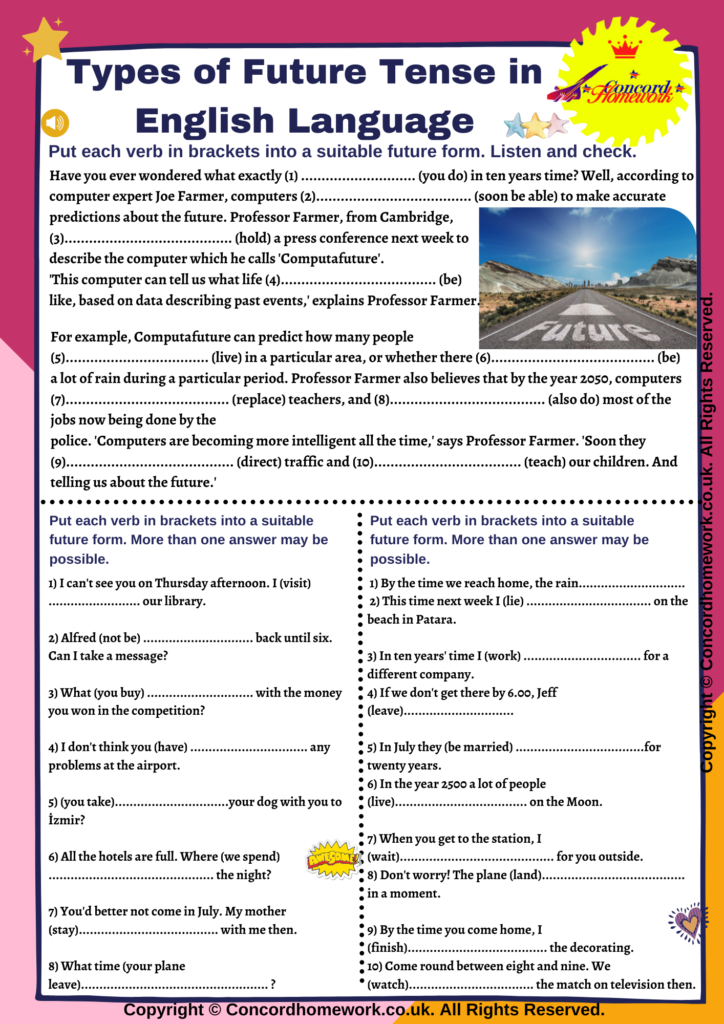Concordhomework.co.uk
Types of Future Tense in English Language
Types of Future Tense in English Language
Explanations
-
Will (prediction)
Will is used to make predictions. It is often preceded by I think or by opinion words like perhaps. A time expression is also necessary.
I think it’ll rain. Perhaps she’ll be late.
In speech, will is contracted to ‘//.
-
Going to
Going to is also used for predictions. It is especially common when we can see the cause of the event.
Look out! There’s a bus coming! It’s going to hit us!
I can see you’re going to have a baby. When is it due?
You’re going to fall!
Going to is also common in impersonal statements.
Liverpool are going to win the Cup.
But will can also be used for most examples like this, with no change of meaning.
-
Future continuous
The future continuous is used to describe a situation in progress at a particular time in the future.
This time next week I expect I’ll be living in London. And I’ll probably be cycling to work.
-
Future perfect
The future perfect looks back from a point in the future.
By the time we get there, the film will have started.
It refers to indefinite time up to that point. This means that when we get to the future point we can say:
The film has started.
-
Going to (Intention)
Going to is used to describe a present intention or plan. This is something we have already decided to do.
I’m going to fix the television tomorrow.
-
Will
Will is used for instant decisions made at the time of speaking.
I know, I’ll get him a wallet for his birthday.
-
Present continuous (Fixed arrangements and timetables)
The present continuous is used to describe definite, fixed arrangements.
Sorry, I can’t help you, I’m leaving in the morning.
The arrangements are often social arrangements or appointments and may be written in a diary.
-
Present simple
The present simple is used to describe future events which are based on a timetable, programme or calendar.
My train leaves at 11.30 tomorrow morning.
When, until, as soon as
After the time expressions when, until and as soon as a present tense form is used, although this refers to future time.
I’ll wait for you here until you get back.
The present perfect is often used in cases like this to emphasize the completion of an event.
I’ll wait here until you have finished.
Listen about the predictions of Professor Farmer.
Writing about describing a place English worksheet
Has got have got Grammar worksheets
Nouns in the English language explained with an exercise
Simple past vs past continuous Exercises pdf printable
In The Neighbourhood free ESL EFL worksheets with answer keys
My Clothes with have got has got free ESL EFL worksheets with answer key
Reading & Listening Comprehension – Read then listen to the text free ESL EFL pdf worksheets with answer keys
Verb be English exercises for beginners pdf
The past simple spelling of -ed endings English worksheet
Vocabulary about countries nationalities and languages English worksheets
All about feelings activities ESL worksheet
Type of film adjectives vocabulary English worksheets
Subject and object pronouns English worksheet
There is and there are in English worksheet
Past time expressions exercises with answers pdf
Possessive Adjectives English Worksheets download best ESL worksheets
Simple present tense Do Does and Yes No questions free printable ESL EFL worksheets with answer keys
Reading & Writing – Personal Information English worksheet
WH- Questions Simple present tense free ESL EFL worksheets with answer keys
Verb to be, Can & Can’t free ESL EFL worksheets with answer keys
Possessive Adjectives 3 exercises Free ESL EFL pdf worksheets with answer keys
Prepared By
Mr. Concord
English Language Blogger

